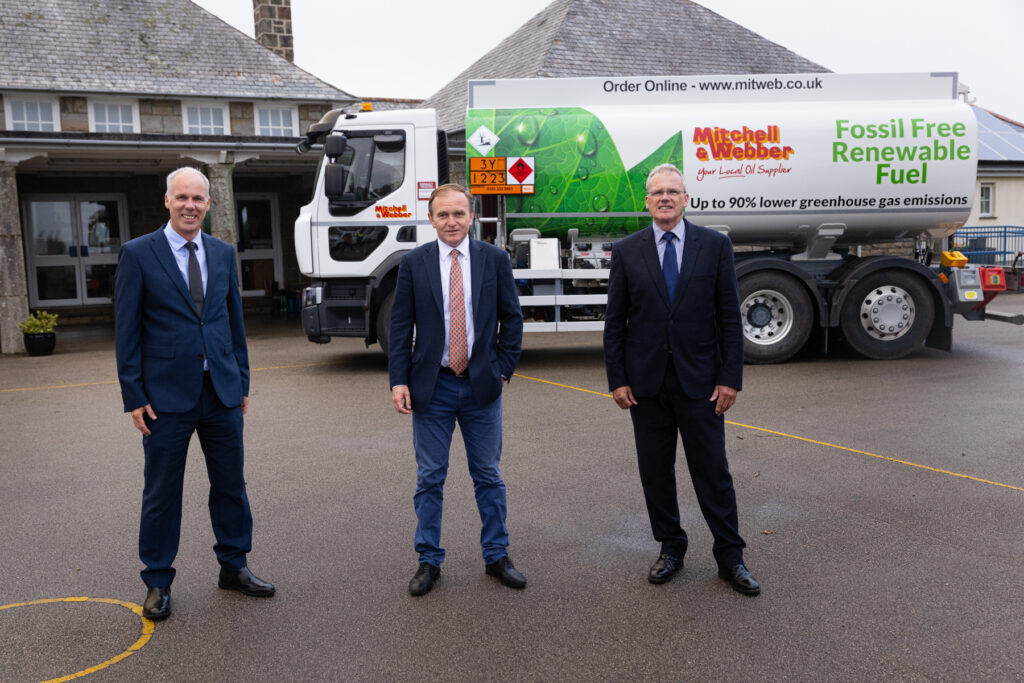The findings from a three year project which saw over a hundred oil heated properties convert to Hydrotreated Vegetable Oil (HVO) have been published, as the liquid fuel heating industry calls for a wider rollout to deliver affordable decarbonisation for off-grid homes.
The ‘Combustion report for the HVO demonstration project’, published by trade associations OFTEC and UKIFDA, reveals 135 properties across the UK took part in the project which saw their kerosene boilers modified to run on 100% HVO.
The conversions delivered a carbon reduction of 88% with minimal upfront cost to transition to the new fuel. An analysis of Hydrotreated Vegetable Oil (HVO) in the report also outlines projections which confirm there is more than enough sustainably sourced fuel for use across the UK’s 1.7 million oil heated homes.
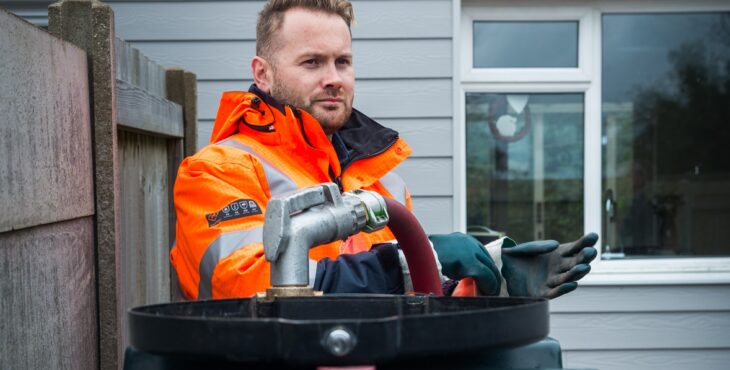
Political context and government policy
In its Heat and Buildings Strategy, published in 2021, the government proposed phasing out the installation of new fossil fuel boilers in the home from 2026 and in larger commercial premises from 2024. The government has since announced both deadlines are being pushed back to 2035 following growing pressure from rural MPs.
However, the long term commitment to transition these homes onto heat pumps remains. An analysis of the government’s online calculator reveals that many oil homes could face upfront costs of over £20,000 to switch to a heat pump.
This is because the buildings tend to be older, poorly insulated and harder to keep warm. For the heat pump to work effectively, expensive and disruptive renovations are often needed, such as insulation measures, new radiators, new piping and in many cases the reintroduction of a hot water storage tank.
In response, the liquid fuel heating industry has outlined a more pragmatic alternative solution in Hydrotreated Vegetable Oil (HVO) through the HVO demonstration project.
Background to HVO demonstration project
The HVO demonstration project was run and fully funded by OFTEC, UKIFDA, associated members, heating technicians and external consultants. 135 buildings were converted from kerosene to HVO across the UK from the South East up to Scotland. This includes homes, pubs, villages halls and churches. The project has been running for three winters.
The project aims were to:
- Demonstrate the simplicity of switching from kerosene to HVO
- Demonstrate the technical feasibility of using HVO in real world situations
- Understand consumer acceptance on the use of HVO to replace kerosene
- Demonstrate the fuel supply infrastructure’s ability to deliver HVO to the point of use
- Demonstrate fuel and emission savings when switching to HVO
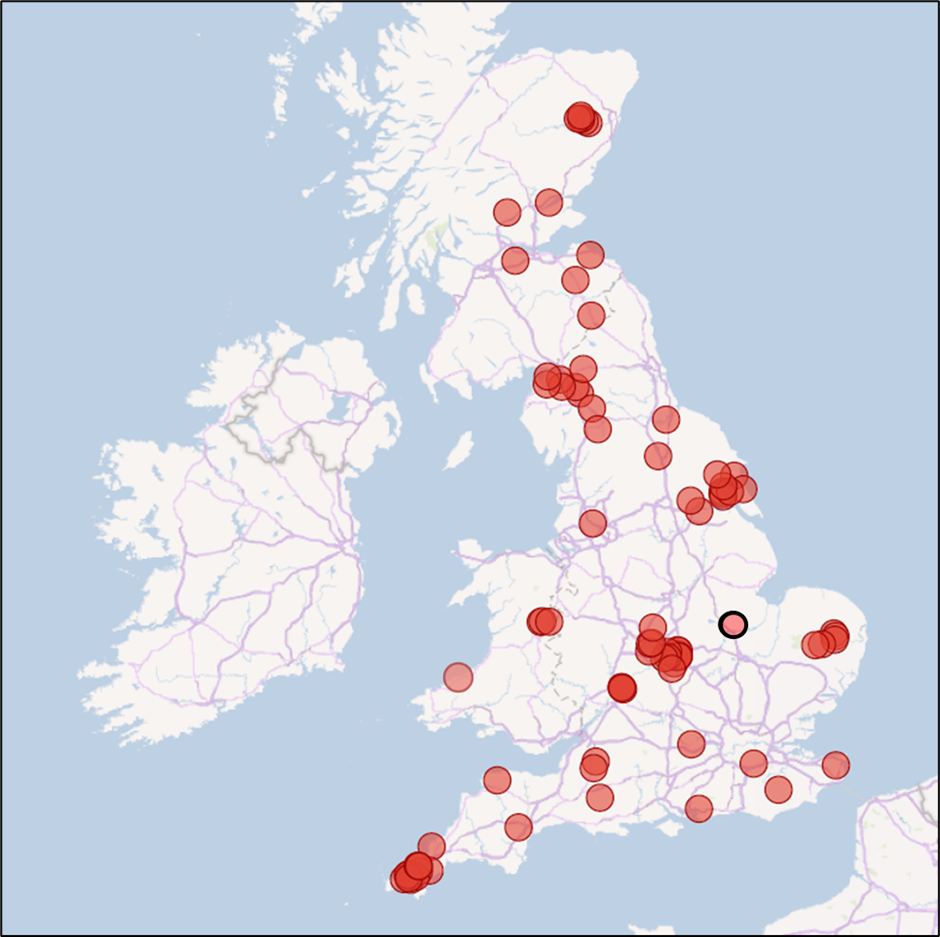
Conversion of the boilers was undertaken during what was equivalent to a routine boiler service visit and fuel replenishment. In most cases, conversions were completed entirely by the local fuel distributor sponsoring the fuel for the site. There were no internal or external insulation measures applied and no adaptions to the heat distribution system.
Findings from HVO demonstration report
The report citied the ease of use when switching from kerosene to HVO. All 135 buildings were successfully converted with no major issues identified. The conversion cost is expected to be less than £500 which can be completed in a couple hours. No additional energy efficiency measures are required and there is no consultation with planning or local electricity suppliers. The resulting reduction in carbon emissions is 88%. There were no reports of diminished performance resulting from the switch to HVO.
HVO also proved to be highly versatile with both domestic and commercial buildings included in the demonstration project. The boiler outputs ranged from 15kW in residential buildings to 100kW in non-residential buildings.
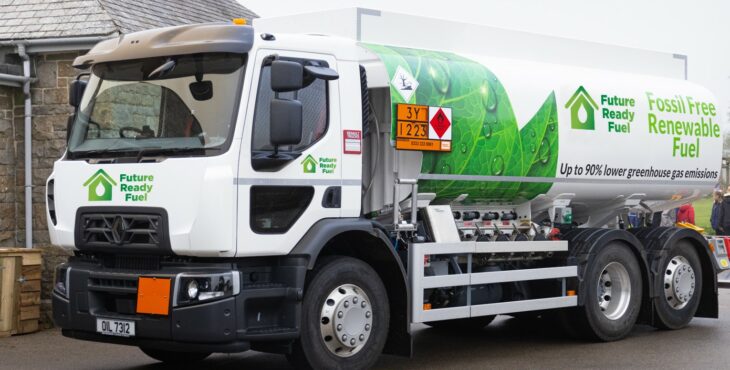
A report from Portland Analytics also found the UK domestic heating oil market can easily be accommodated within the overall requirement for renewable liquid fuels and that there is more than enough projected feedstock availability to meet renewable liquid fuel consumption requirements.
The consumption of HVO in the demonstration project to date is estimated to be 450,000 litres. In terms of carbon dioxide emission reductions, the volume of kerosene displaced by HVO to date equates to a reduction of approximately 1,220 tonnes.
Case studies
Feedback from participants in the demonstration project was overwhelmingly positive. Users remarked that day to day they saw no difference in performance between kerosene from HVO. There was anecdotal feedback from several participants that they felt their supply of HVO was lasting longer than the equivalent for kerosene and technicians remarketed the nozzles and boilers were much cleaner when using HVO.
Cornish village offers a blueprint for rural decarbonisation
A rural coastal village in Cornwall was converted to HVO by fuel distributors Mitchell and Webber as part of the demonstration project. Over the course of 18 months, 17 homes as well as the local church and school, in the village of Kehelland, participated in the scheme.
The report also found that the equivalent capital costs, using a UK government estimation tool, of installing an air source heat pump with all the necessary retrofitting and heating system changes would have cost the Kehelland residents an average of £22,000 per property.
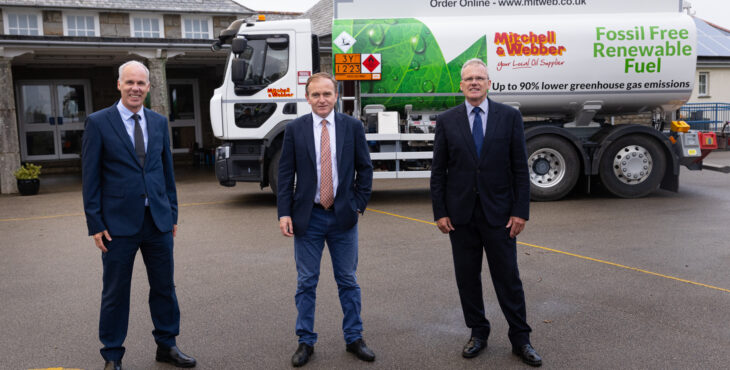
Local MP and former Secretary of State for Environment, Food and Rural Affairs George Eustice visited the sites on multiple occasions to pledge his support to the campaign and helped to build support amongst other rural MPs. He commented:
“It is vital that we look to new, greener technologies to heat our homes if we are going to be able to stay on track to hit net-zero by 2050, but this is a challenge in rural areas, which often rely on oil boilers.
“Finding a way to allow them to convert their boilers at reasonable cost to a fuel with a lower carbon footprint may well be part of the solution in the medium term. So, I’m very pleased to see that my constituency is leading the way with this nationally-leading trial of HVO.”
Kehelland resident and participant in the trial, Dave Biggs, said:
“HVO is a great option for our home and we’re so pleased we made the switch – we’re saving nearly five metric tonnes of carbon every year as a result! We wanted to reduce our carbon emissions but the cost of installing a heat pump would have been very high for us. The simple switch in fuel was so easy.”
Cheers to HVO: Rural pub celebrates transition to renewable heating
A rural pub in south Lincolnshire achieved net-zero emissions thanks in part to the renewable liquid heating fuel Hydrotreated Vegetable Oil (HVO).
The Five Horseshoes Inn in Barholm village first adopted the fuel in Summer 2021.The 300 year old pub has since become what is believed to be the first rural establishment in the country to achieve carbon neutral status.
Switching to HVO immediately reduced the pub’s annual carbon emissions by 88%. To off-set the remaining 12% and reach carbon neutrality, fifteen trees were planted in nearby schools on behalf of The Five Horseshoes Inn throughout the year.

The rural pub’s transition to HVO was supported by St Neots based company, EOGB Energy Products Ltd., which replaced the pub’s old 1970s boiler with a state-of-the-art modulating boiler to deliver even greater efficiency. The EOGB team also installed smart controls including thermostatic radiator valves, occupancy sensors and apps for remote access to support the establishment’s flexible heating needs.
Next steps for HVO demonstration project
Trade associations OFTEC and UKIFDA have called on the government to back a wider rollout of HVO, arguing the demonstration project and subsequent report shows that HVO is a cost effective, pragmatic and realistic solution for decarbonising off-grid homes and businesses which would otherwise struggle to switch to a heat pump.
In October 2023, Parliament passed legislation which opened the door to making renewable liquid fuels more affordable for off-grid homes by introducing a Renewable Liquid Heating Fuel Obligation (RLHFO). This mirrors similar legislation in the transport sector which has been running successfully for nearly 20 years.
The legislation is subject to a consultation but it has not yet been published. OFTEC and UKIFDA argue that given this uses a tried and tested route, there’s no reason the government can’t move this forward immediately.
Secondly, in his recent Autumn Statement, the Chancellor was also called upon to reduce the tax paid on renewable liquid fuels for heating. The request was not to be treated any differently but to afford renewable fuels used in heat the same tax treatment as in transport.
In transport, these fuels have the same tax as fossil fuels. In heating, the renewable fuel is taxed at a higher rate than the fossil fuel. OFTEC and UKIFDA are urging the Chancellor to rectify this at the next opportunity or in the budget.
Following the findings of the HVO demonstration report, OFTEC and UKIFDA are also investigating how HVO can be recognised in the Energy Performance Certificate (EPC) calculation methodology and continuing to update existing training materials for technicians to prepare for the rollout of HVO.

